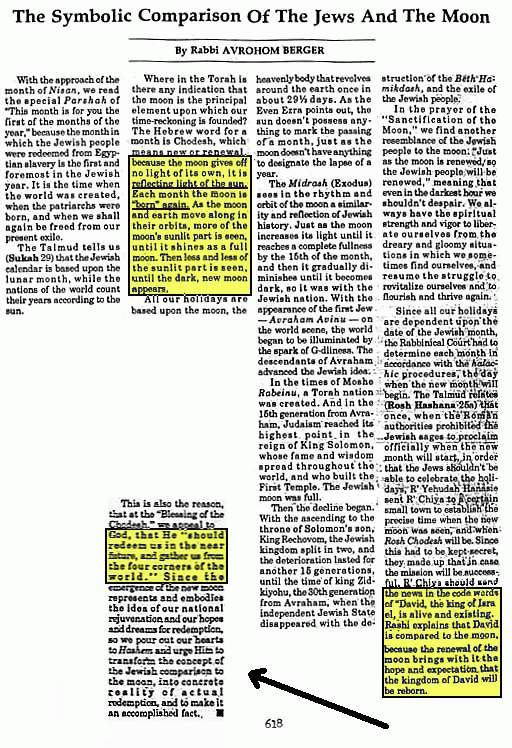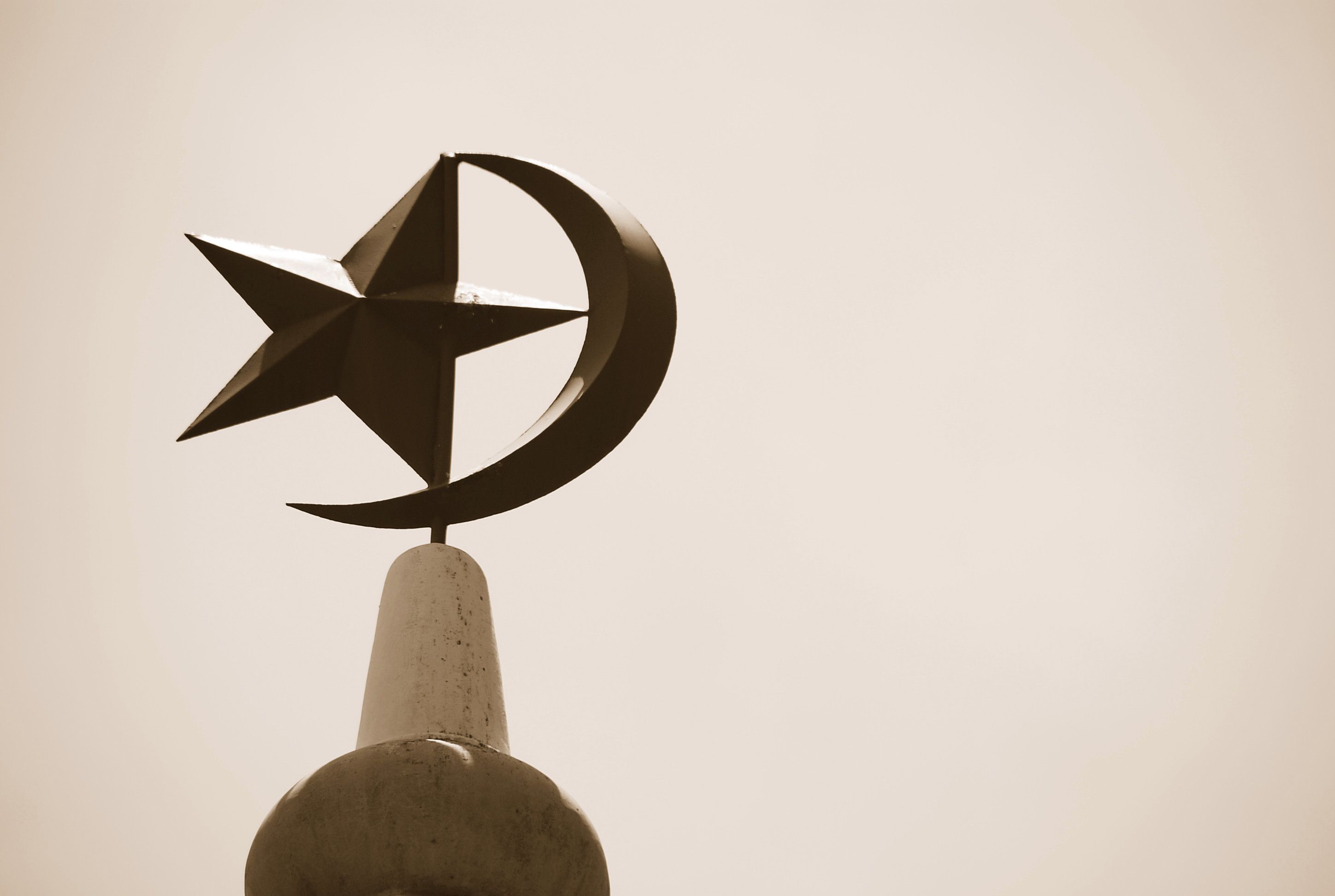Apart from the claim that “Allah” is the name of the moon god, the Christian missionaries also tend assert this claim by questioning why the crescent moon in Islam is used as a symbol to represent the religion, or why is the crescent moon or full moon used in Islam to mark a new month in the Islamic lunar calendar.
They engage into the logical fallacy of equivocation to justify their allegation ; since Muslims use the crescent symbol to represent Islam, it therefore also follows that Muslims worship some kind of “moon god” and Islam is the religion of the moon god.
However, this is no more truer than claiming that since Judaism adopts the Star of David symbol, it follows that the Jews considers it as an object for worship, or that Christians worship the Crucifix since it is used as its symbol.
[toc]
Does The Crescent Symbol Represent A Deity ?
To begin, let us define the meaning of the Arabic word “Allah”, as used by Muslims to refer to God. Lane’s Lexicon defines the meaning of the word “Allah” as referring to “the only true god”:
However, let us now look at a different approach to the issue, i.e. the purpose of the moon in Islam, and a comparison of this with the other Abrahamic religions, namely Judaism and Christianity.
This paper will attempt to explain the significance of the crescent moon in Islam and repudiate the idea that Islam condones moon worship, insha’Allah.
Islam and the Crescent Moon
Islam never teaches nor does it expound moon worship. It, in fact, repudiates it, as the following verse confirms :
“Among His Signs are the Night and the Day and the Sun and Moon. Prostrate (adore) not to the Sun and the Moon but prostrate to God, Who created them, if it is Him ye wish to serve.” (Qur’an, 41 : 37)
So what is the function of the moon in Islam ? The only function it plays in Islam is that it determines the Islamic lunar calendar. The Qur’an confirms this when it speaks of the moon being subject to God’s Law.
We read the following verse :
“They ask you, [O Muhammad], about the new moons. Say, “They are measurements of time for the people and for Hajj.” And it is not righteousness to enter houses from the back, but righteousness is [in] one who fears Allah. And enter houses from their doors. And fear Allah that you may succeed.” (Qur’an, 2:189)
We are also informed of the following :
“Seest thou not that God merges Night into Day and He merges Day into Night ; that he has subjected the sun and the moon (to His Law), each running its course for a term appointed : and that God is well acquainted with all that ye do?” (Qur’an, 31:29)
If Allah” (God) is indeed the “moon god” as claimed by misguided Christians, why would that very same “moon-god” create the moon for the use of mankind ?
In short, the claim that Muslims worship “Allah the moon-god” simply because of the crescent symbol is nothing but a heinous lie which is not based on any concrete evidence.
Judaism and the Moon
It is interesting to note that the Jews also adopt the lunar calendar to mark their holy festivals. The Jewish religious calendar, of Babylonian origin, consists of 12 lunar months, amounting to about 354 days. Six times in a 19-year cycle a 13th month is added to adjust the calendar to the solar year. The day is reckoned from sunset to sunset.
The moon also plays an important role in a symbolic comparison with the Jewish nation. We reproduce below an article written by Rabbi Avrohom Berger that states as such.

The article above would clearly refute the nonsense that Islam based its calendar on the moon because it was a religion of the moon god, for if Islam was really the religion of the moon god, what is the religion of the Jews who used (and still use) the lunar calendar and constantly analogizes itself to the moon ?
In fact, a Jewish site confirmed the above by stating :
The Jewish Nation has been likened to the moon. Our history, cyclical in nature, waxes and wanes like the moon through its cycle hidden at times, but always reemerging to full blossom.
http://www.judaism.com/calendar2000/backgroud.htm
Condemning the Jewish religion as “moon worship” based on the “logic” (or rather, the lack of it!) of the Christian missionaries would, however, lead to serious implications that could undermine their own faith, as Jesus(P) was a learned Rabbi and faithful Jew himself. However, they have no qualms condemning Islam for using the lunar calendar. Such double standards are not alien to Christian thought, after all the end justifies the means, just as Paul did the same.
Christianity and The Sun
We have seen that both Judaism and Islam, as in the tradition of Semitic culture, use the lunar calendar to mark their months. The question now is why Christianity adopted the solar calendar, instead of the lunar ?
As surprising as it may seem to the missionary, the adoption of the sun as the official calendar of ‘Christianity’ occurred as late as 325 C.E. and was due to the prevailing pagan influences of sun worship. Christians chose to celebrate the birth of Jesus on 25th December because this was the date of an already existing festival of the Sol Invictus was expressed in an annotation to a manuscript of a work by 12th-century Syrian bishop Jacob Bar-Salibi. The scribe who added it wrote :
“It was a custom of the Pagans to celebrate on the same 25 December the birthday of the Sun, at which they kindled lights in token of festivity. In these solemnities and revelries, the Christians also took part. Accordingly, when the doctors of the Church perceived that the Christians had a leaning to this festival, they took counsel and resolved that the true Nativity should be solemnised on that day.“
Ramsay MacMullen, “Christianity and Paganism in the Fourth to Eighth Centuries” (Yale, 1997), p. 155
The cult of the sun-god was the most popular creed at the advent of Jesus(P) and was prevalent in all the countries into which the religion called “Christianity” was later introduced in. Pagan gods such as Apollo or Dionysus among the Greeks, Hercules among the Romans, Mithra among the Persians, and Osiris, Isis and Horus in Egypt et. al., are all sun-gods
In the face of the evidence, one cannot help but conclude that the adoption of the solar calendar is certainly due to the strong Hellenistic influences of the sun-god cult during its adoption.
Conclusions
It is clear that the creation of a calendar is for the purpose of keeping time in perspective. Time is measured in relative terms, from sunrise to sunset ; from the time the sun casts the shortest shadow to the same time the next day ; from one harvest time to another.
In ancient times, the phases of the moon were an easy means of measuring the passage of time. The first calendars were lunar calendars. Ancient civilizations such as the Assyrians, Babylonians, Egyptians and the Chinese used the lunar calendar.
Consequently, the Semitic culture also adopted this calendar which includes Judaism and Islam, with the exception of Christianity using the solar calendar due to pagan Hellenistic influences from the Greco-Roman culture. Clearly, the purpose of the crescent moon in Islam is nothing more than to keep track of dates and months as Islam adopts and utilises the lunar calendar. In light of this fact, Islam, therefore, uses the crescent symbol to represent the religion graphically. There is no logical reason to associate the lunar calendar of Islam with moon worship.
And certainly, only God knows best ! 
[cite]
Last Updated on March 24, 2019 by Bismika Allahuma Team


